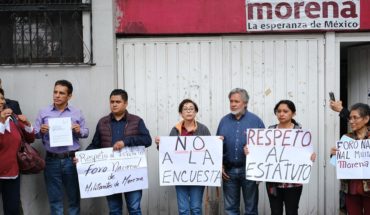
Gonzalo Bacigalupe, an academic and master’s degree in Public Health at Harvard University, posed a dramatic reality regarding Chile’s current landscape of the coronavirus pandemic. Through a column and titled “Chile and COVID-19: We start from scratch”, he agreed that the Government was advised by researchers on “streetless” artificial intelligence and “without understanding our idiosyncrasies”.
“They did not learn from what had happened in countries with similar cultures – social relations of great closeness, high distrust of authority, emerging from political and social crises – like Italy and Spain,” says the opinion expert published by La Segunda.
For the reason set out, the academic, along with 30 other researchers, decided to send an open letter to the President of the Republic for action and to prevent this from being “a catastrophe”.
The signatories, among which is the Chilean Society of Epidemiology, say that pandemic containment cannot be based on the number of new mechanical fans or beds available. They ensure that the strengthening of the hospital system is important and positive for the country, but a change of strategy is urgently needed that seeks to cut the chain of contagion and includes massive and systematic testing, with a broad, comprehensive, cross-sectoral and interdisciplinary social approach, putting the protection and well-being of the community at the center.
“The international scientific evidence is clear,” they say, pointing out that the basis of the confrontation should be a timely and active strategy in testing, detecting, going out looking for cases, reporting, tracing, isolating contagions and tracking everyone.
“This must be accompanied by the isolation and timely closure of cities or regions, which will soon be saturated by high levels of contagion, in order to avoid not repeating the current situation of the Metropolitan Region, where it was acted late,” they warn.
To achieve a good strategy against the virus, the researchers recommend that Primary Care should be integrated as the central axis of this strategy, because territorial management with the community is located, where hundreds of plotters distributed in all regions of Chile, dedicated to investigating, locating, identifying and reporting cases, should be incorporated.
“These plotters will be key to reducing contagion in the short term, but also in the work of acting quickly in the containment of microepidemias in the following months, when the first big curve passes. Complementing the work of plotters, it is proposed to activate digital health technology platforms to achieve this goal,” they explained.
The signatories emphasize that one of the priority elements should be to expand the testing capacity that allows them to leave health facilities and go in search of cases. This, they say, requires increasing the number of PCR tests and the processing capacity of these, in order to reduce result wait times and thus speed up case identification and traceability.
“Access to medical licenses for formal workers should be ensured, at the time of clinical suspicion (suspicious or probable cases), awaiting confirmation or with a history of close contact, without waiting for a result of a diagnostic-confirmative test or authorization by SEREMI,” they comment in the missive.
In addition, in the view of the researchers, it is necessary to promote a clear strategy of health residences, as the pandemic has spread to places in the country where populations are living in social vulnerability and overcrowding. In that sense, they claim that diagnosing is not enough.
“Patients living in these conditions are required to be sent to a residence where they can meet effective isolation. This is hardly suspected of the disease and only with medical indication. Not to do so, it involves sending them home, increasing the risk of contagion in their environment,” they emphasized.
For scientists, it is also urgent that measures of physical estrangement, isolation and mass quarantines be effective. And for this to happen, they ensure that it is a priority to establish social, logistical and economic measures that allow restrictive measures not to lead the community to face the disjunction between health or livelihood.
“We have known that 15% of people infected with Covid-19 go out to work out of economic necessity, according to a study carried out by the Medical College and the University of Chile, thus exposing the rest of the population to become infected. This leads us to be more proactive and faster in improving the strategy developed in terms of economic measures,” they said.
Social measures, local authorities, children and gender
With regard to other edges exposed by the pandemic, the researchers propose to assess, first, that boxes with merchandise are replaced with direct subsidies to families who depend on self-employed workers, who have unemployed people and who generally see their income decreased to make ends meet the confinement. At the same time, they are calling for progress on projects that assess forgiveness for basic services for the duration of the health emergency and provide clean heating subsidies that reduce the use of firewood.
“Drug spending in Chile is one of the highest in Latin America. Therefore, some of the direct financial aid must be in support of the purchase of drugs, especially for children and adolescents with chronic diseases, whose parents are stranded or unable to work for quarantine,” they say.
In his view, it is important to strengthen the territorial diversity, leadership and characteristics of each community. That is why it is urgent that a social support programme for municipalities be established, in such a way as to allow them to expand their technical, management, and logistics capacity in the territory. In this way they say that it would be possible to project that restrictive measures can be complied with by the majority of the population.
In addition to these social measures, they say that a stricter control plan needs to be activated than the current one that allows for effective quarantine compliance. And they recommend establishing a comprehensive social support programme that allows irregular foreigners to access the social benefits of the State, creating a Temporary Humanitarian Register incorporated in the Social Registry of Households.
“It is necessary to understand how important it is to establish bonds of trust, so that foreigners in the stated condition can access these kinds of benefits without fear of deportation. You need to work together with social organizations that have already built that link,” they added.
In the face of the collective psychological trauma of a pandemic, they recommend an even more forceful strategy in mental health for the present, but also for the postdemic. And, to monitor the impact of the gender-focused pandemic, they call on the State to ensure the availability of gender-disaggregated data, to provide weekly statistics on gender-based violence, reflected in domestic violence accentuated by current conditions, to strengthen victim residences, and to train Primary Health Care staff to go on support.
“Access to menstrual, sexual and reproductive health is imperative, and for the Executive to urgently urge bills that address the challenges of motherhood, such as the one that promotes the extension of the post natal during the pandemic,” they said.
At the last point – but not least – the signatories say that a high standard for transparency and access to information needs to be established, for which the National Council for Transparency, the Comptroller General of the Republic, the Legislative Power, medical, scientific and academic societies should be involved in agreeing on a standard in this area.
They say that what is required is 100% of the transparency of the properly anonymised disaggregated data currently recorded by the Epivigila system. For this, they request that each case of coronavirus be made available with more than detailed information.
In addition, they propose that the communication strategy contain clear, simple and massive messages, “avoiding the war, confrontational and centralized language, which holds people responsible for the spread of the virus, stigmatizes specific groups and deepens the mistrust between citizens, and between individuals, authorities and their institutions. It in turn exacerbaizes mental health problems in the population by increasing their stress levels.”
“A comprehensive social strategy should take over the externalities of the decisions envisaged in the plan, without establishing in third parties the reason why some action does not achieve the expected results. On the contrary, in such cases what is appropriate, especially in emergency, is to take the necessary corrective measures,” they said.
The signatories ask Piñera to consider their proposals immediately as, at their trialor, we are facing a country emergency and it is prevailing to “revive the governance structure that has historically allowed us to be resilient to disasters.”
See the full chart here.





